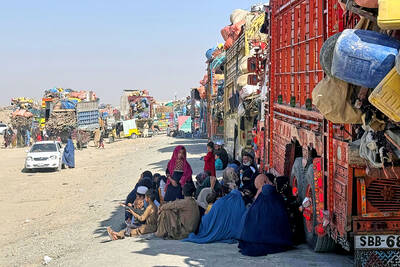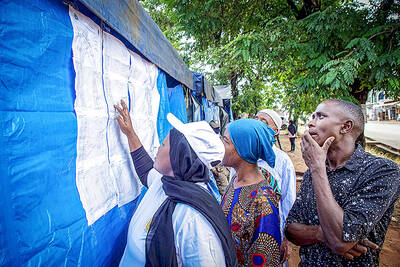As Japan and the US start talks on how to respond to armed incidents that fall short of a full-scale attack on Japan, officials in Tokyo worry that their ally is reluctant to send China a strong message of deterrence.
Military officials meet this week in Hawaii to review bilateral defense guidelines for the first time in 17 years. Tokyo hopes to zero in on specific perceived threats, notably China’s claims to the Japanese-held Diaoyutai Islands (釣魚台) in the East China Sea, which are also claimed by Taiwan, while Washington is emphasizing broader discussions, officials on both sides say.
Washington takes no position on the sovereignty of the islands, called the Senkaku Islands by Japan and the Diaoyu Archipelago (釣魚群島) by China, but recognizes that Japan administers them and says they fall under the US-Japan Security Treaty, which obligates the US to come to Japan’s defense.
However, even as Asia-Pacific security tensions mount, US officials have made clear they do not want to get pulled into a conflict between the world’s second and third-biggest economies.
Japanese Prime Minister Shinzo Abe’s government is alarmed at China’s rapid military buildup. Beijing in turn accuses Tokyo of being a regional threat, citing Abe’s more nationalist stance, his reversal of years of falling military spending and his visit to a shrine that Asian countries see as glorifying Japan’s wartime past.
“Japan wants to prioritize discussions on China, and clarify the respective US and Japanese roles in the event of a ‘gray zone’ incident,” a Japanese government official said, referring to less than full-scale, systematic military attacks backed by a state, but still representing a threat to Japan’s security.
Tokyo wants Washington to join in drafting scenarios for how the two allies would respond in specific cases, he said.
However, Washington is worried about provoking China by being too specific, Japanese officials and experts say.

With much pomp and circumstance, Cairo is today to inaugurate the long-awaited Grand Egyptian Museum (GEM), widely presented as the crowning jewel on authorities’ efforts to overhaul the country’s vital tourism industry. With a panoramic view of the Giza pyramids plateau, the museum houses thousands of artifacts spanning more than 5,000 years of Egyptian antiquity at a whopping cost of more than US$1 billion. More than two decades in the making, the ultra-modern museum anticipates 5 million visitors annually, with never-before-seen relics on display. In the run-up to the grand opening, Egyptian media and official statements have hailed the “historic moment,” describing the

‘CHILD PORNOGRAPHY’: The doll on Shein’s Web site measure about 80cm in height, and it was holding a teddy bear in a photo published by a daily newspaper France’s anti-fraud unit on Saturday said it had reported Asian e-commerce giant Shein (希音) for selling what it described as “sex dolls with a childlike appearance.” The French Directorate General for Competition, Consumer Affairs and Fraud Control (DGCCRF) said in a statement that the “description and categorization” of the items on Shein’s Web site “make it difficult to doubt the child pornography nature of the content.” Shortly after the statement, Shein announced that the dolls in question had been withdrawn from its platform and that it had launched an internal inquiry. On its Web site, Le Parisien daily published a

‘NO WORKABLE SOLUTION’: An official said Pakistan engaged in the spirit of peace, but Kabul continued its ‘unabated support to terrorists opposed to Pakistan’ Pakistan yesterday said that negotiations for a lasting truce with Afghanistan had “failed to bring about a workable solution,” warning that it would take steps to protect its people. Pakistan and Afghanistan have been holding negotiations in Istanbul, Turkey, aimed at securing peace after the South Asian neighbors’ deadliest border clashes in years. The violence, which killed more than 70 people and wounded hundreds, erupted following explosions in Kabul on Oct. 9 that the Taliban authorities blamed on Pakistan. “Regrettably, the Afghan side gave no assurances, kept deviating from the core issue and resorted to blame game, deflection and ruses,” Pakistani Minister of

UNCERTAIN TOLLS: Images on social media showed small protests that escalated, with reports of police shooting live rounds as polling stations were targeted Tanzania yesterday was on lockdown with a communications blackout, a day after elections turned into violent chaos with unconfirmed reports of many dead. Tanzanian President Samia Suluhu Hassan had sought to solidify her position and silence criticism within her party in the virtually uncontested polls, with the main challengers either jailed or disqualified. In the run-up, rights groups condemned a “wave of terror” in the east African nation, which has seen a string of high-profile abductions that ramped up in the final days. A heavy security presence on Wednesday failed to deter hundreds protesting in economic hub Dar es Salaam and elsewhere, some